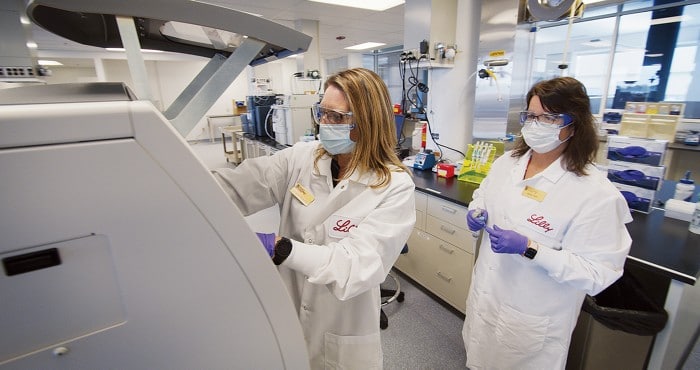Inside Eli Lilly’s Race For A Coronavirus Therapy

This month, Lilly launched the first trial of an antibody treatment. Courtesy Eli Lilly and Company
To the uninitiated, LY-CoV555 reads like nothing more than a strong Internet password. But that collection of five letters and three numbers could soon have worldwide significance. Some 30 coronavirus patients across the U.S., in places such as the NYU Grossman School of Medicine and Cedars-Sinai in Los Angeles, have been dosed this month with the world’s first potential antibody treatment designed to fight COVID-19, thanks to local pharmaceutical giant Eli Lilly and Company. Here, we talk with Ajay Nirula, Lilly’s vice president of immunology who is running the trial, about the future of the study that could reach its third phase in a “matter of months.”
The coronavirus is, of course, a novel virus. How has your background prepared you for this unfamiliar moment?
My background is as a physician and a scientist, and I was a faculty member in academic medicine for a while in California, at UC San Francisco, in rheumatology. That was my specialty, but I came to the industry around 15 years ago because I was very passionate about developing new therapies. At Lilly, I’ve been leading our immunology efforts. I spent a lot of time working on therapies for autoimmune diseases like rheumatoid arthritis and lupus, skin diseases like psoriasis and atopic dermatitis, and inflammatory bowel disease. But in the last few months, with what’s been going on with the pandemic, I’ve been serving as the medical lead for our COVID antibody program. Everyone is pulling together to try and help combat this global pandemic.
As COVID started to spread in the very early parts of this year, Lilly’s leadership team started to think about how we could get involved. One of the signature events was signing a partnership with AbCellera, which is a Canadian company based in Vancouver, British Columbia.

Lilly—joined by the Canadian company AbCellera—is racing to find what could be the first potential COVID-19 antibody treatment in humans.Courtesy Eli Lilly and Company
How did this study come about?
AbCellera profiled the blood of a patient who was ill with the disease and who ultimately recovered. Basically, they took some of the cells from the blood and obtained the exact antibodies that the patient used to fight the disease, then they sent those to us. We then used our expertise in antibody technology and engineering. A lot of our therapeutics are actually antibodies, including some of the drugs in my therapeutic area, immunology. We were able to profile close to 500 antibodies from this recovered patient, and we were able to narrow them down to the best 20 or so, those with the best ability to block the action of the virus.
At this point, we’re not entirely clear how much of the experimental drug is needed, so we’re giving a pretty good size dose just to make sure that we have enough. Right now, we’re doing it as a one-time intravenous infusion. So you get it and you should have enough drug on board for at least a month to potentially find and neutralize the virus. What will happen over time is we’ll start to understand exactly how much antibody is really needed and what dose is needed.
Antibodies help fight off illnesses. But what are they, really, in layman’s terms?
They’re very complex molecules, made by specialized cells in our immune system, that can bind to foreign invaders. Our immune system has a really elegant process for identifying what is “self.” It won’t make antibodies to “self” cells. So anything foreign, we have some preexisting antibodies to, and when they bind to a virus, they have mechanisms to help destroy that thing. They’re sort of the torpedoes of our immune system against foreign invaders, if you will.
What is happening now with this trial of 30 patients?
We’re weeks away from the readout of this initial study. We could be months from the readout of bigger studies. We’ll see what the data shows, but if it looks positive and we feel there’s an important benefit to patients with COVID, we will be having discussions with regulatory authorities about how to make this available to patients quickly.
How many other antibody studies like this are happening across the globe right now?
This was the first clinical trial of an antibody that’s been custom designed to fight the virus, but there are lots of companies developing these types of antibodies. So I would say within a few weeks, there will be others.
Whether its facilitating tens of thousands of tests for essential workers in Indianapolis or pursuing an antibody therapy, Lilly seems to have focused its efforts on the coronavirus. What’s driving that?
Lilly is really excited to be a part of the battle against this pandemic that has impacted the world in an enormously negative way. We want to partner with the best scientists, whether they’re in academics or at our peer companies or at small biotech companies. This is a real team effort. Within Lilly, we’ve been emphasizing the importance of teamwork in the last few years, and “Team Lilly” is a term we use a lot now. But now, it’s a global team. We want to do whatever it takes to be a part of the solution. We are very committed to that cause.





